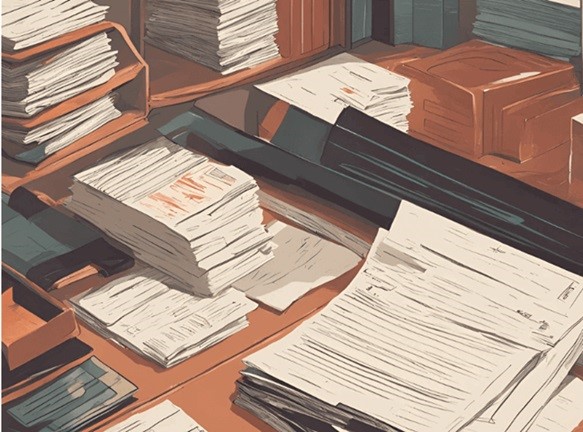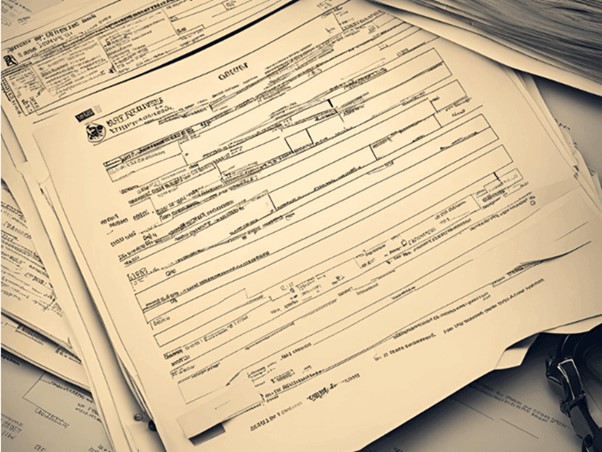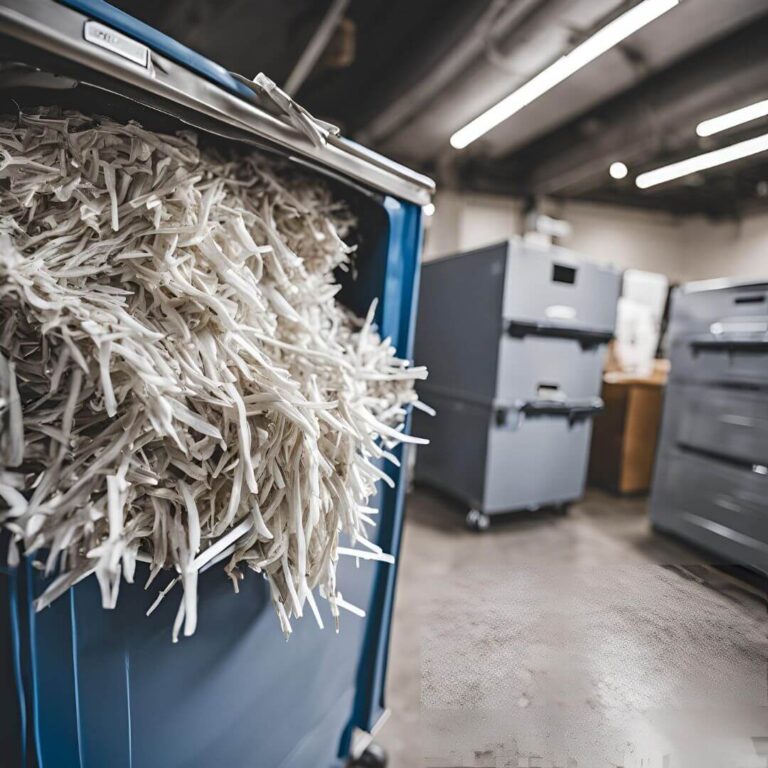It is important to understand the duration for which you should retain your confidential data and legal documents. Keeping records for the required time before the destruction of documents is vital for legal and regulatory compliance.
The length of time you need to keep these documents can vary depending on the specific type of document and its purpose.
For instance, financial and business records, such as tax returns and invoices should generally be kept for a minimum of five years.
On the other hand, legal documents like contracts and agreements may need to be retained for a longer period, especially if they are still in effect or if there is a possibility of future disputes.
It is crucial to consult with legal professionals or relevant authorities to ensure compliance with the specific legislative requirements for document retention.
Mastering Document Retention Policies
Keeping records that support information, such as the tax returns filed by the individuals you are taxing, or records of receipts is crucial.
However, there are certain situations where exceptions may apply, and specific types and formats of records will vary based on their purpose and requirements.
What is a record?
Records refer to written documents that provide a detailed account of certain types of information, such as financial records or employment records. Storage of these records is usually either electronically or on paper.
Understanding the Regulations and Laws Governing Document Retention
Various regulations and laws that vary depending on the industry, state and type of document govern keeping records. It is essential to have a thorough understanding of these regulations to ensure compliance and avoid potential legal issues. Some key points to consider include:
- The Privacy Act 1988 – It sets out obligations for the handling of personal information and also requires companies and organizations to take reasonable steps to protect personal information from misuse, interference, and loss.
- Industry-Specific Regulations – Such as the Corporations Act 2001 for companies, the Health Records Act 2001 for healthcare providers, and the Financial Services Reform Act 2001 for financial institutions.
- Requirements by Country or State – One of which is the Australian Securities and Investments Commission (ASIC) guidelines, which provide specific requirements for document retention and storage for companies regulated by ASIC.
By understanding and adhering to these regulations, organizations can ensure they are meeting their legal obligations and protecting sensitive information.
Why is it Important to Keep Documents and Records
There are several reasons why it is necessary to retain documents and records for a certain length of time:
- Legal Compliance – Many regulations require organizations to retain certain documents for a specified period. Failing to do so can result in penalties and legal consequences.
- Litigation and Disputes – In the event of a legal dispute, having accurate and complete records can be crucial in defending your organization’s position in court.
- Audits and Investigations – Documents and records serve as evidence during audits or investigations by regulatory bodies or internal auditors.
- Business Continuity – Retaining key documents ensures that essential information is available in case of emergencies, such as natural disasters or system failures.
- Historical Reference – Documents and records provide a historical record of an organization’s activities and decisions, which can be valuable for future reference or analysis.
Thus, by keeping documents and records, organizations can ensure legal compliance, protect themselves in disputes, facilitate audits and investigations, maintain business continuity, and preserve a historical record.
Key Components of a Document Retention Policy
A document retention policy outlines the rules and guidelines for managing documents throughout their lifecycle.
Here are a few key components to help you manage documents and for keeping records:
Document Classification
It is important to organize documents according to their nature, significance, and duration of retention. This practice promotes uniform management and guarantees that documents are preserved for the appropriate timeframe.
Duration of Retention
You will need to determine the specific period for which to keep each category of document. Legal mandates, industry norms, or operational requirements usually influence this decision.
Storage and Accessibility
It is crucial to specify the methods for storing and accessing documents to uphold confidentiality, security, and ease of retrieval. This may involve physical filing systems, digital databases, or cloud-based platforms.
Disposal Protocols
Established procedures for the secure and proper disposal of documents that are no longer necessary are vital. This could entail shredding paper documents, incinerating sensitive materials, or securely deleting electronic files.
Accountability for Record-keeping
Businesses must allocate roles and duties to managing documents, including responsibilities for categorizing, storing, retrieving, and disposing of records. This ensures the clear definition and effective execution of document management tasks.
By including these key components in a document retention policy, organizations can effectively manage their documents and ensure compliance with retention requirements.
Benefits of Implementing a Document Retention Policy
Implementing a document retention policy can provide several benefits for organisations and individuals, including:
- Improved efficiency by managing a well-defined document retention policy that streamlines document management processes. Thus, making it easier to locate and retrieve information when needed.
- Saving costs by properly managing documents and records. Thus, organisations can avoid unnecessary storage costs and reduce the risk of fines or legal penalties for non-compliance.
- Enhancing data security using document retention policies to ensure the secure disposal and storage of sensitive information. This reduces the risk of data breaches or unauthorized access to confidential papers.
- Adhering to document retention requirements, organizations can avoid legal issues and demonstrate compliance during audits or investigations.
- Having access to accurate and complete records enables informed decision-making based on historical data and analysis.
Challenges and Risks of Poor Document Management
Poor management of documents and other electronic copies of records, will easily result in many challenges and potential risks:
- There is the risk of non-compliance by failing to keeping records for the required period or not following proper document destruction procedures. This could potentially result in legal consequences.
- Data breaches and privacy breaches could result from inadequate document security, which could lead to exposing sensitive information and compromising an individual’s privacy.
- The loss of important information can result from the lack of a proper document management system. Organizations may struggle to locate and retrieve critical documents when needed, leading to delays and inefficiencies.
- Inefficient document management practices can result in unnecessary storage costs and potential fines for non-compliance.
- Poor document management practices could potentially damage an organization’s reputation. This is especially true when there is a loss or compromise of sensitive information.
By recognizing these challenges and risks, organizations can prioritize effective document management and implement appropriate measures to mitigate them.
Keeping Records – What are the Time Frames
Records need to be kept for a minimum of five to seven years from the time they of creation or acquiring the documents, especially if they pertain to a specific transaction or act.
In some cases, records may need to be retained for even longer periods, such as when an individual has invested capital that is eligible for capital gains.
ASIC mandates that businesses maintain operational data for a duration of seven years to ensure compliance with regulations and to facilitate audits or investigations if necessary.
Business and Employee Records
- Business and employee-related documents typically need to be retained for a minimum of 5-7 years.
- Companies usually have to keep employee documents like administrative papers, health insurance, HR documents, work permits, and leave records for 7 years.
- Tax records for employees and work-related injury records should be retained for 5 years.
- It is necessary for businesses to keep most records for 5-7 years from the time they create or acquire them.
- Documents related to work expenses, investments, assets, employee contracts, confidentiality agreements, orders, invoices, and shareholder agreements should be kept for 7 years.
- The memorandum of understanding, which contains conversations between business partners, suppliers, and others, has a fixed retention period.
- Tax records for businesses typically have a retention period of 4-5 years.
Personal Records
Individuals should keep personal confidential information, such as social security numbers, financial details, and medical information, for as long as it remains relevant and unchanged.
It is important to keep tax and tax return documents, as well as financial records, for all transactions for a period of 7 years. This ensures that you have all the necessary documentation in case of any legal proceedings or audits.
Just like legal documents, any medical records should also be retained for a minimum of 7 years. This allows individuals to have a comprehensive record of their medical history, which can be useful for future reference or when seeking medical advice.
By maintaining these records for 7 years, individuals can ensure that they have a complete and accurate record of their financial and medical history. This not only helps in complying with legal requirements but also provides a sense of security and peace of mind.
Best Practices for Document Retention and Secure Document Destruction
Document retention and destruction are crucial aspects of managing confidential and legal documents. Establishing best practices is important to ensure secure storage and disposal of sensitive documents and information when no longer needed.
Here are a few best practices for document retention and destruction process of documents:
- Always implement a comprehensive document management system that includes proper categorization, labelling, and storage of documents.
- Regularly revise and update document retention policies to align with changing regulations and business needs.
- Train employees on document management procedures and the importance of confidentiality.
- Establish a clear process for document destruction, such as document shredding, or secure electronic deletion.
By following these best practices, organisations and individuals protect their sensitive information and maintain compliance with legal requirements.
As a final thought:
Document retention periods may vary according to certain policies, legal requirements, and state laws. However, as noted for example, most documents, with the exception of some tax documents, have a minimum retention period of 7 years.
Proper document destruction, such as shredding documents, is necessary to protect individuals and companies against fraud, identity theft and data breaches.
Keeping accurate records is crucial as they serve as evidence that you have carefully thought through your decisions and taken the necessary steps. These records act as a shield when you face questioning or challenges, providing you with the necessary protection.
Ensuring that governance is carried out effectively and efficiently relies heavily on proper management of records. It serves as the foundation for creating policies, allocating resources, and providing services. Additionally, maintaining records properly is essential for holding individuals accountable and safeguarding their rights.
I am a skilled writer, proficient in creating informative and engaging content for my audience. With my enthusiasm for security and environmental factors, secure document shredding has sparked my interest.
I have a strong research background and a deep understanding of the importance of secure document shredding today, especially with the rise of the digital era. My passion lies in educating businesses and individuals on the importance of protecting their sensitive information and the necessity of secure document shredding and recycling.
Through my well-researched articles, I hope to inspire and educate my readers on the complexities of document shredding, safeguard privacy, and emphasise the importance of contributing to sustainable efforts.
Furthermore, I am committed to raising awareness about data security and waste reduction. Every blog post I create follows strict and meticulous guidelines to ensure that my readers receive valuable and factual insights into the vast landscape of the shredding service industry and data security practices.
- Eliza Van Eykhttps://shred2u.com.au/author/eliza/
- Eliza Van Eykhttps://shred2u.com.au/author/eliza/
- Eliza Van Eykhttps://shred2u.com.au/author/eliza/
- Eliza Van Eykhttps://shred2u.com.au/author/eliza/









